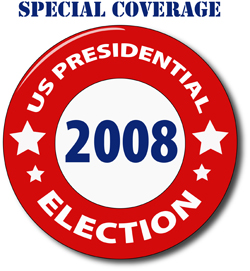Beyond God, guns and gays: US evangelicals head to polls
 Washington - Democrat Barack Obama may seem more comfortable discussing his Christian faith than any presidential candidate from his party since Jimmy Carter in 1976, but his focus on reaching out to religious voters appears to be doing little to swing a key voting bloc - evangelicals.
Washington - Democrat Barack Obama may seem more comfortable discussing his Christian faith than any presidential candidate from his party since Jimmy Carter in 1976, but his focus on reaching out to religious voters appears to be doing little to swing a key voting bloc - evangelicals.
Evangelical Christians make up about 20 per cent of the electorate and have been among the backbone of the Republican Party for nearly 30 years, pushing the party further to the right on social issues, with their opposition to abortion and gay marriage.
But Democrats hoped some of those voters could be persuaded to support Obama this year, buoyed in part by a new focus on issues such as global warming and poverty among younger evangelical leaders.
Obama, who is the son of a Muslim from Kenya and was raised in a largely secular household before become a practicing Christian as a young adult, even hired an outreach coordinator for people of faith and lauded so-called faith-based initiatives that allow religious organizations to apply for federal money to run social service programmes.
"Jesus Christ died for my sins and I am redeemed through him," Obama told a forum of Christian voters featuring both candidates at the 22,000-member Saddleback Church outside Los Angeles earlier this year.
But he was hurt by his refusal to address the perennial hot-button issue of abortion. When asked when life begins, he replied: "To answer it with that specificity is above my pay grade." And remarks at a fundraising event during the primary elections in which he referred to "bitter" voters who "cling to guns or religion" continue to sound a sour note on the campaign trail.
At a rally for Republican candidate John McCain in Pennsylvania this week, one man waved a sign proclaiming "Pennsylvanians for guns and religion."
McCain's choice of Alaska Governor Sarah Palin as his vice presidential pick was partly an attempt to shore up the vote of the same social conservatives. Palin, herself an evangelical Christian, has spoken out strongly against abortion and has been lauded by abortion opponents for her decision to give birth to a baby with Down syndrome earlier this year.
"They stand for the morals I believe in," Melissa George, 40, said, stressing the importance of Palin's pro-life credentials at a campaign rally for the Republicans last month in Virginia.
Despite Obama's gains among the general electorate, large numbers of evangelicals look unlikely to migrate to his camp ahead of November 4 elections.
A survey released last month by the Pew Centre on Religion and Public Policy and the University of Akron found 57.2 per cent of white evangelicals support McCain, albeit less enthusiastically than past Republicans. Just 20 per cent were firmly in Obama's camp. This compares to 60.4 per cent support among the broader group for Bush in 2004.
McCain's support is even more stark among those with the most traditional views - such as a literal interpretation of the Bible - and most frequent attendance at religious service, with 71.6 per cent.
Still, social issues as a whole are not as likely to be as key as in past years.
The Pew survey showed the economy was the top issue among all categories of religious voters, from the most traditional evangelicals to atheists, and the issue is only likely to grow in importance as the financial crisis has dominated headlines in recent weeks.
"Considering the increased priority given to the economy across all religious communities, but particularly among evangelicals and other conservative Christians, it seems to me that the economy would give Obama an opportunity to pull some of those voters away from McCain," said John Green, who conducted Pew's survey.
Though more recent polls show that Obama has picked up some support from evangelicals amid the ongoing economic woes, McCain still has a substantial lead with these voters.
Obama does appear to have drawn away support from less regular churchgoers. A poll last week by Faith in Public Life found those who attend religious services once or twice a month support Obama at a rate of 60 per cent, compared to just 49 per cent of occasional worshippers who cast their ballots for Democrat John Kerry in 2004.
Some observers have said Obama's move to reach out to religious voters was aimed more at peeling away support from this less diehard group, as well as Catholics and members of more liberal mainstream Protestant congregations.
In fact, an Obama staffer told magazine Christianity Today the move was aimed primarily at these mainline Protestants - such as Lutherans, Methodists and Episcopalians - in key swing states. The Pew study shows non-Latino Catholics split 44 per cent for McCain and 39 per cent for Obama, while so-called mainline Protestants split 43 per cent for McCain to 40 per cent for Obama. (dpa)